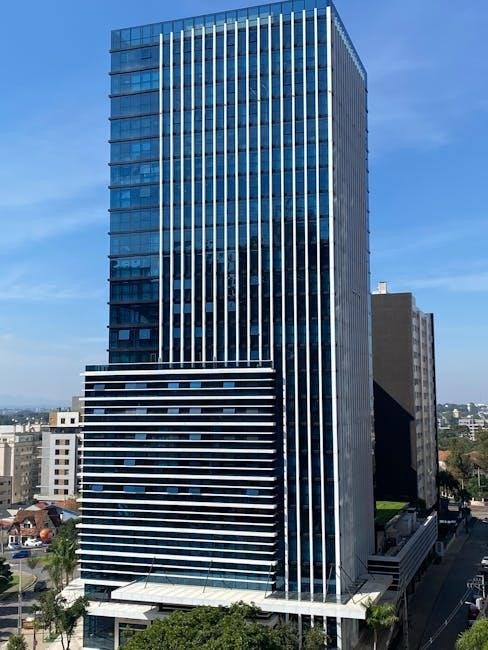commercial lease application pdf
Summary
Download the commercial lease application PDF for free. Easy to use and professional template for your rental needs.

A commercial lease application is a document used by landlords to assess potential tenants for non-residential properties. It typically includes business details, financial statements, and rental history to evaluate suitability and ensure a mutually beneficial agreement.

Overview of Commercial Lease Applications
A commercial lease application is a formal document used by landlords or property managers to evaluate potential tenants for commercial spaces. It typically includes detailed business information, financial statements, rental history, and proposed use of the property. This document helps landlords assess the suitability and credibility of applicants, ensuring the lease agreement aligns with both parties’ interests. The application process is crucial for verifying the tenant’s ability to meet lease obligations and maintain the property responsibly. It also outlines the terms and conditions of the lease, providing clarity for both landlords and tenants. Proper completion of the application is essential for a smooth and legally binding agreement.
Importance of a Commercial Lease Application

A commercial lease application is a critical tool for landlords to assess potential tenants’ credibility and financial stability. It helps mitigate risks by evaluating the applicant’s ability to meet lease obligations. The document ensures transparency, outlining the tenant’s business operations and rental history. This process protects both parties by verifying the tenant’s suitability and aligning expectations. A well-structured application streamlines the leasing process, reducing disputes and ensuring compliance with legal requirements. It is essential for building a secure and mutually beneficial landlord-tenant relationship, safeguarding the property’s value and the tenant’s business interests.
Key Components of a Commercial Lease Application
A commercial lease application includes personal and business information, financial statements, credit checks, rental history, references, and proposed use of the property to ensure tenant suitability and compliance.
Personal and Business Information
A commercial lease application requires detailed personal and business information to assess the applicant’s credibility. This includes the applicant’s legal name, business name, and contact details. For businesses, the structure (e.g., LLC, corporation) and ownership information are essential. Landlords may also request IDs, such as driver’s licenses, to verify identities. Additionally, details about key personnel, including principals or major stockholders, are often included. This section helps landlords evaluate the applicant’s reliability and ensure compliance with lease terms. Accurate and complete information is crucial for a smooth approval process.
Financial Statement and Credit Check
A commercial lease application typically requires a financial statement to demonstrate the applicant’s ability to meet rental obligations. This includes income statements, balance sheets, and bank statements. Landlords often conduct a credit check to assess the applicant’s creditworthiness. A good credit score and stable financial history increase the likelihood of approval. For businesses, the PAYDEX score may also be evaluated. Providing accurate and detailed financial information helps landlords gauge the tenant’s reliability and ensure timely payments. This step is critical in minimizing risks for the property owner.
Rental History and References
The rental history section of a commercial lease application requires details about the applicant’s previous leasing experiences. This includes names and contact information of former landlords or property managers. Applicants may also need to provide professional references, such as business associates or financial institutions, to validate their credibility. Accurate and positive rental history demonstrates reliability and responsibility, increasing the likelihood of approval. Inaccuracies or negative reports could lead to application denial. Strong references and a clean rental history are essential for building trust with the landlord and securing the lease agreement.
Proposed Use of the Property
The proposed use of the property is a critical section in a commercial lease application, requiring a detailed description of the business activities intended for the space. This information helps landlords assess whether the planned use aligns with the property’s zoning, safety regulations, and overall suitability. Applicants must specify the type of business, operational hours, and any specialized equipment or modifications needed. This clarity ensures compliance with local laws and helps landlords evaluate potential impacts on the property. Accurate disclosure of the intended use is essential for drafting a lease agreement that meets both parties’ needs and expectations.

The Process of Completing a Commercial Lease Application
Completing a commercial lease application involves submitting detailed business and financial information, followed by landlord review and approval. The process ensures both parties understand the lease terms.
Step-by-Step Guide to Filling Out the Application
Begin by gathering all required documents, including business and personal details, financial statements, and rental history. Step 1: Fill in personal and business information accurately.
Step 2: Attach a detailed financial statement and credit reports for verification.
Step 3: Provide rental history and professional references to demonstrate reliability.
Step 4: Clearly describe the proposed use of the property and its alignment with business goals.
Finally, review and sign the application, ensuring all information is complete and accurate before submission.

Required Documentation and Attachments
When submitting a commercial lease application, ensure all necessary documents are included. Attach business and personal information, such as legal business name, address, and incorporation details. Financial statements, including income statements and balance sheets, are essential for assessing creditworthiness. Credit reports for both the business and its principals may also be required. Provide a rental history with previous landlord references and any professional references to validate reliability. Additional documentation, such as a proposed use of the property, may be requested to align with the landlord’s criteria.
Screening Process for Commercial Tenants
Landlords evaluate potential tenants by verifying business legitimacy, reviewing credit scores, and assessing financial stability. Rental history and professional references are also scrutinized to ensure reliability.
How Landlords Evaluate Potential Tenants
Landlords assess commercial lease applications by reviewing business legitimacy, creditworthiness, and financial stability. They verify the applicant’s business registration, credit score, and PAYDEX score. Rental history, professional references, and the ability to meet lease terms are also evaluated. The landlord may request guarantor information if the tenant’s financial standing is uncertain. This process ensures the landlord selects a reliable tenant who can uphold the lease agreement and maintain the property responsibly. A thorough evaluation helps minimize risks and ensures a smooth tenancy experience for both parties.
Red Flags to Watch Out for in Applications
Landlords should be cautious of incomplete or inaccurate information in a commercial lease application. Unverifiable business details, poor credit history, or missing financial statements are significant red flags. Applications with no references or inconsistent rental history may indicate unreliability. Additionally, requests for unusually long or short lease terms or unrealistic expectations about rent can signal potential issues. Landlords should also beware of applicants who are unwilling to provide guarantors or those with a history of disputes. Thoroughly evaluating these red flags helps landlords avoid risky tenants and ensure a stable tenancy agreement.

Financial Considerations in Commercial Leasing
Understanding the financial aspects of a commercial lease is crucial. Key considerations include rent calculations, security deposits, hidden costs, and the necessity of a thorough financial review.
Understanding Rent, Deposits, and Other Costs
When evaluating a commercial lease, it’s essential to understand the breakdown of rent, deposits, and additional expenses. Rent typically covers the lease term, while deposits secure the property. Other costs may include maintenance, utilities, and property taxes. A detailed review of these financial components ensures clarity and prevents unexpected charges. Proper budgeting and negotiation can help tenants manage their expenses effectively. Always verify these costs in the lease agreement to avoid financial surprises.
Negotiating Lease Terms and Conditions
Negotiating lease terms is crucial for balancing tenant and landlord interests. Key areas to focus on include rent structure, lease duration, renewal options, and responsibilities for maintenance. Tenants should seek clarity on escalation clauses and termination rights. It’s also important to review exclusivity clauses and any restrictions on property use. Ensuring the lease aligns with business needs while protecting financial interests is vital. A thorough review and negotiation can prevent future disputes and create a fair agreement for both parties. Legal expertise can assist in navigating complex terms and securing favorable conditions.

Legal Aspects of Commercial Lease Applications
Commercial lease applications must comply with local laws and regulations, ensuring legal validity. They often outline liability, insurance requirements, and dispute resolution processes to protect both parties.
Compliance with Local Laws and Regulations
Compliance with local laws and regulations is crucial when preparing a commercial lease application. The document must adhere to zoning laws, health codes, and environmental regulations. Ensuring legal validity protects both landlords and tenants from potential disputes. Non-compliance can lead to penalties or lease termination. Tenants must verify that the property meets all requirements for their intended business use. Landlords are also responsible for disclosing any legal issues. Proper compliance ensures a smooth and legally binding agreement, safeguarding both parties’ interests throughout the lease term.
Liability and Insurance Requirements
Liability and insurance requirements are essential components of a commercial lease application. Tenants are typically required to provide proof of general liability insurance to cover potential damages or injuries on the premises. Additional insurance, such as property damage or business interruption coverage, may also be mandated. Landlords may specify minimum coverage limits to protect their interests. Failure to meet these requirements can result in lease termination or legal action. Ensuring adequate insurance coverage safeguards both parties and minimizes financial risks associated with unexpected events or business disruptions during the lease term.

Common Mistakes to Avoid
Common mistakes in commercial lease applications include incomplete information, lack of proof of funds, and missing documentation, which can delay approval or result in rejection.
Errors That Could Delay or Deny Approval
Errors in commercial lease applications, such as incomplete sections, missing documentation, or inaccurate financial data, can delay or deny approval. Unsigned forms, outdated financial statements, or unverified business details often lead to rejection. Additionally, failure to disclose past evictions, bankruptcies, or legal disputes raises red flags. Incomplete rental history or missing guarantor information can also cause issues. Providing false information or omitting critical details may result in immediate denial. Ensuring all fields are filled accurately and submitting all required documents on time is crucial for a smooth approval process.
Tips for a Smooth Application Process
To ensure a smooth commercial lease application process, start by gathering all required documents in advance. Complete the form thoroughly, ensuring accuracy in personal and business details. Submit financial statements, credit reports, and rental history promptly. Be transparent about past issues like evictions or bankruptcies. Follow the landlord’s instructions carefully, and submit the application well before deadlines. Double-check for errors or missing information before submission. Providing clear, concise, and honest responses helps build trust and accelerates approval. Organizing attachments neatly and verifying contact information can also prevent delays.